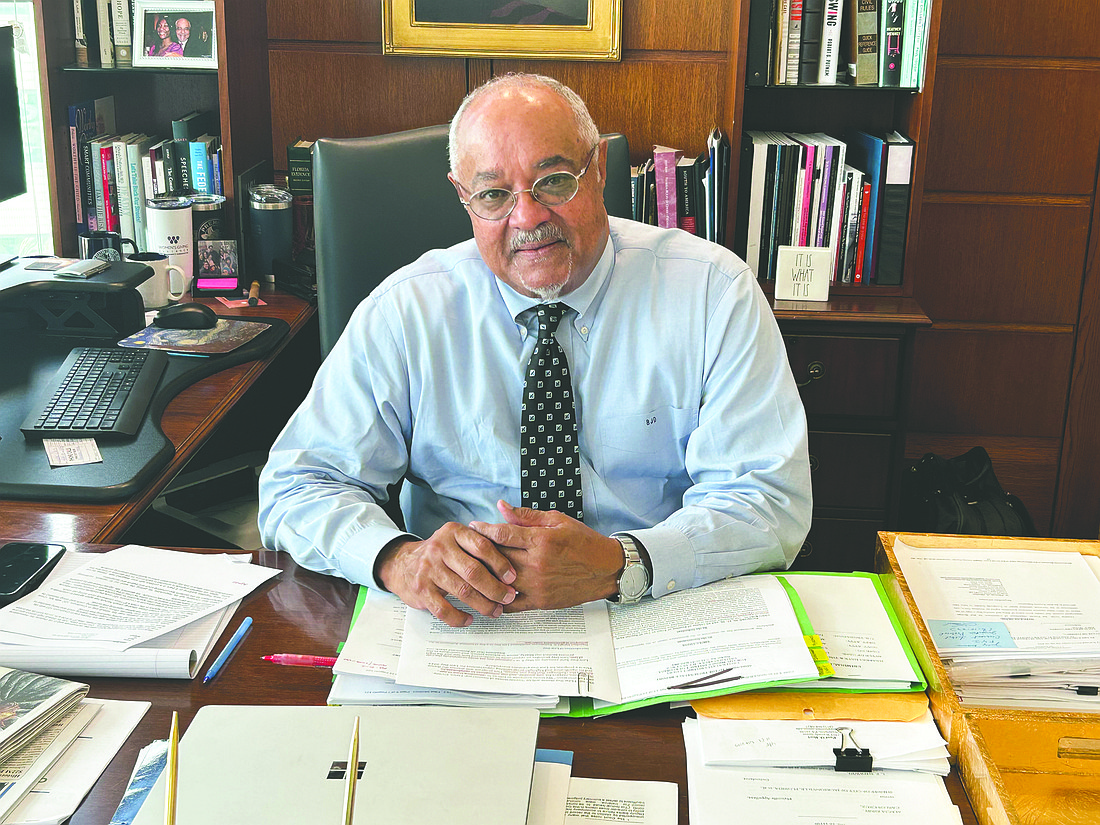
U.S. District Judge Brian Davis’ chambers are on the 11th floor of the Bryan Simpson U.S. Courthouse, providing him views of downtown Jacksonville’s historic buildings, more recent developments, and much of the legal community.
Davis, who was appointed to serve as judge with the U.S. District Court for the Middle District of Florida in 2013, is scheduled as the keynote speaker at the May 4 Jacksonville Bar Association Luncheon as part of Law Week.
This year’s national Law Week theme is “Cornerstones of Democracy: Civics, Civility, and Collaboration.”
Davis considers civics “a subject that needs to be taught more thoroughly and interestingly in our community and really in our nation.”
“Years ago there was an emphasis on it in the education system and then it waned,” he said.
“But it is being emphasized in the education system and in the courts again, which is a good thing.”
Davis said the Law Week theme is an example of the court’s efforts to educate citizens more about not just their rights, but their responsibilities, as citizens.
Civility, he said, is about “the order of the day.”
“We as a culture, in the last 10 or 15 years or so, have moved from a healthy respect for one another that did not preclude meaningful and productive discourse to an impasse,” Davis said.
“It’s based on what appears to be mutual disrespect and callousness.”
He said the current civility culture climate has forced citizens into “opposing corners.”
“It’s causing our nation and our communities to not thrive. To be stagnant,” Davis said.
“We’re not making progress. One might even argue we are losing ground we have gained around those values that I’m still convinced most Americans hold dear.”
Davis said those values include freedom, liberty, due process and life itself.
“As an observer, like any observer, I am concerned the democracy that’s caused us to be the world’s leader of the last century is being eroded,” he said. “It’s extraordinarily frightening.
“We have to move forward now because the alternative is unacceptable.”
That’s where the theme of collaboration becomes key, he said, and it begins with voting.
“I hope this emphasis on civics and civility establishes the drawing of the line between the use of the ballot and the quality of our lives,” Davis said.
“In Jacksonville and across the nation.”
He said the importance of voting hasn’t been made clear to American citizens, as evidenced by low voter turnout.
“One in four casts a vote, and our country was founded on preventing the tyranny of the majority and having checks and balances in place to address that,” Davis said.
“So few of us participate in that important political process, in that important collective collaboration, that we are perhaps at a crossroads.”
Beyond voting, Davis stressed the importance of being educated and well informed, avoiding stereotypes and listening.
“You have to have respect for even your opponents that just hasn’t been prevalent more recently,” he said.
“To drive the point home, look at the recent election process. The negativity of the campaigns is an embarrassment.”
Davis said the focus of campaigns should be on substantive issues, humility and respect, and not personalities.
To Jacksonville’s young legal community, he said it is important to remain focused on the diversity of its makeup and the diversity of its ideas.
“The old guard didn’t really have that diversity that is so important,” Davis said.
“And I believe that through diversity we get better outcomes.”
Davis earned his bachelor’s degree from Princeton University in 1974 and his law degree from the University of Florida Levin College of Law in 1980.
He was in private practice in Jacksonville from 1980-82, then served as an assistant state attorney in the 4th Judicial Circuit from 1982-88, returning to private practice from 1988-91.
Davis served as chief assistant state attorney with the 4th Judicial Circuit from 1991-94 and then was named a Circuit Court judge. He served as a Circuit Court judge from 1994-2013.
President Barack Obama nominated Davis to the U.S. District Court on Jan. 4, 2013. Confirmed by the Senate on Dec. 20, 2013, he received his commission Dec. 26.